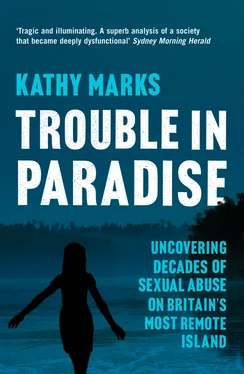When Operation Unique started, Salt was helpful. Police worked out of his office, at his invitation, and he unearthed documents from his archives for them. He was a fund of useful information, most of which he carried in his head. When police voyaged to Pitcairn to interview suspects, the Commissioner went too, and stayed with them at the Lodge. Salt, say British officials, was level-headed about the island and ‘didn’t buy into the myth’. Almost everyone, including Simon Moore, regarded him as a thoroughly good bloke.
Those who know him say he was revolted by the child abuse allegations. But he felt it was ‘inappropriate to apply a UK solution to a Pitcairn problem’, he told the Governor. Salt wrote, ‘The UK has ignored law and order on Pitcairn for 200 years … It would seem perhaps incongruous that UK justice is to be imposed in all its might after all this time, particularly given the fact that reported serious crime has escaped investigation in the past.’
Salt supported an amnesty and, astonishing as it seems, he even told police, according to Peter George, ‘I’ll get the men to plead guilty—provided there’s an amnesty first.’
After that avenue was closed, his attitude changed. Detectives asked Salt to sign an affidavit releasing documents from his office; if the affair got to court, he would have to give evidence for the Crown. He refused, and withdrew all co-operation from the inquiry, telling prosecutors that if they proceeded as they intended, history would ‘judge them very poorly’.
The men and their families, unwilling to see the case go to trial, pressed, instead, for a ‘truth and reconciliation commission’, based on the body that probed human rights abuses in apartheid-era South Africa. The idea of transposing truth and reconciliation to Pitcairn had initially appealed to major players, including Simon Moore, but had to be abandoned once it was decreed by Baroness Scotland, Britain’s Overseas Territories Minister, that the conventional legal process had to take its course. Still, Moore remained hopeful that the healing principles it embodied could be integrated into that process.
New Zealand is a pioneer of ‘restorative justice’, which offers criminals who plead guilty the opportunity to express remorse, apologise to their victims and make reparations; when they then go before a court to be sentenced, they can expect a significantly reduced penalty. Moore believed that this approach would enable most of the Pitcairn men to avoid prison. Christine Gordon, his deputy, consulted restorative justice experts, and researched a model employed in a Canadian – Indian community where generational child sexual abuse had been exposed.
Конец ознакомительного фрагмента.
Текст предоставлен ООО «ЛитРес».
Прочитайте эту книгу целиком, купив полную легальную версию на ЛитРес.
Безопасно оплатить книгу можно банковской картой Visa, MasterCard, Maestro, со счета мобильного телефона, с платежного терминала, в салоне МТС или Связной, через PayPal, WebMoney, Яндекс.Деньги, QIWI Кошелек, бонусными картами или другим удобным Вам способом.












